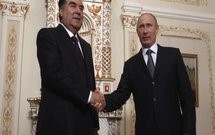 A new military agreement between Russia and Tajikistan will open new opportunities for bilateral cooperation just as both countries are experiencing growing challenges to their security. Tajik President Emomali Rakhmon said after a meeting with Russian President Vladimir Putin in Moscow on Aug. 1 that Tajikistan's parliament will ratify an agreement extending Russia's military presence in the country until 2042. With a Tajik presidential election in November and the U.S. military exit from neighboring Afghanistan looming in 2014, Rakhmon has an interest in solidifying ties with his country's traditional security guarantor at this sensitive time.
A new military agreement between Russia and Tajikistan will open new opportunities for bilateral cooperation just as both countries are experiencing growing challenges to their security. Tajik President Emomali Rakhmon said after a meeting with Russian President Vladimir Putin in Moscow on Aug. 1 that Tajikistan's parliament will ratify an agreement extending Russia's military presence in the country until 2042. With a Tajik presidential election in November and the U.S. military exit from neighboring Afghanistan looming in 2014, Rakhmon has an interest in solidifying ties with his country's traditional security guarantor at this sensitive time.
A holdover from the Soviet era, Russia's military presence in Tajikistan is the largest that Moscow has in any former Soviet state. There are a combined 7,000 Russian troops at three military bases in Tajikistan, including one near the capital, Dushanbe, and one in the south near the border with Afghanistan. The renewed lease, which was set to expire at the beginning of 2014, will give Russia a long-term presence in a country that has become a key part of Moscow's broader security strategy.
Tajikistan, which plunged into civil war shortly after its independence from the Soviet Union, has continued to rely on Russia as a security guarantor. The country is riven with factionalism, and its poorly trained and equipped army following independence was not in a position to provide security against the numerous threats of the post-Soviet era. Its vulnerabilities included a long and porous border with neighboring Afghanistan, which itself descended into civil war in the 1990s, as well as tensions with other former Soviet states in Central Asia, particularly Uzbekistan. Russia's military presence was seen as a shield against Uzbek military aggression, while Russian security personnel were responsible for patrolling the border with Afghanistan.
Despite Dushanbe's dependence on Moscow, tensions between Russia and Tajikistan had increased over a number of issues in recent years. In 2005, Rakhmon called for the removal of Russian border guards from the Tajik-Afghan border in favor of a Tajik-dominated security presence. While this border was difficult to control, it served as an excellent source of revenue due to the large narcotics trade that flows from Afghanistan. Tajikistan has rebuffed Russia's attempts to return to the border. Other diplomatic disputes, such as migrant issues and a spat over airline pilot detentions, also surfaced between the countries. Moreover, the status of Russia's military presence was a matter of contention, with Tajikistan asking for more money to keep the lease active. Though the countries agreed on a lease extension in 2012, the Tajik parliament had not ratified the agreement.
Rakhmon's announcement that the deal will be ratified by year's end indicates that the two sides have overcome their differences on the issue. With the Tajik presidential election approaching, the long-serving Tajik leader wants to ensure that he has Moscow's support, especially since opposition forces such as the Islamic Renaissance Party of Tajikistan have been gaining momentum.
More important, Rakhmon is concerned about the impending withdrawal of U.S. forces from Afghanistan and how it will affect Tajikistan, which has traditionally suffered the most spillover of militants and weapons of any Central Asian country. In addition, although Tajikistan benefits economically from the flow of drugs through the country, concerns have risen after a spike in domestic drug consumption in recent years, increasing the likelihood of cooperation with Russia to stem and better control the drug trade. It is thus key for Rakhmon to retain Russia's support, both militarily and politically.
The base extension is also likely to lead to increased bilateral cooperation in other areas. Indeed, Russian Defense Minister Sergei Shoigu said on the same day as Rakhmon's announcement that Russia would provide $200 million to modernize the Tajik army through 2025. Moscow will also likely ease its strict policy toward Tajik migrants working in Russia in response to the ratification; it tends to back off this issue when Dushanbe is cooperative on strategic matters.
The status of the border forces will remain the most controversial issue between the two, but there is room for compromise on the matter, particularly if the border experiences more activity or violence. Therefore, Tajik-Russian security ties in general can be expected to increase as both countries see similar challenges to the regional security environment continue to grow.
Courtesy : Stratfor (www.stratfor.com)